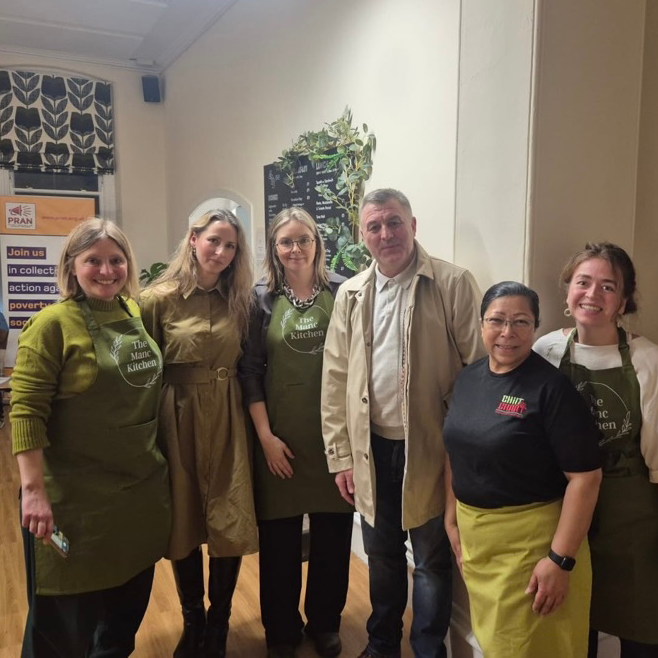The Manc Kitchen - Imagining a right to food in Manchester
In the UK today, millions of people struggle to put food on the table, and food banks have become a lifeline for many. But surely access to food be a legal right? This is the belief behind the Right to Food Campaign, launched in 2020 by Liverpool West Derby MP Ian Byrne and Fans Supporting Foodbanks.
Picture (left to right): Maria Rusca - Volunteer, Natalija Atas - Organiser, Adele Wylie - Organiser, Ian Byrne - MP for Liverpool and West Derby, Kala Mandviwala - Chef, Kata Cieślik - Volunteer
The campaign calls for food access to be enshrined in law, placing responsibility on the UK government to address food poverty—an issue that has worsened due to decades of austerity.
One of the campaign’s key proposals is the utilisation of community kitchens, which present a modern approach to social dining, reminiscent of the British Restaurants introduced during wartime. Ian Byrne trialled this idea in 2022 with the Scouse Kitchen, transforming a Liverpool school canteen into a communal dining space where families could sit together and share a meal. Inspired by Ian’s work, I reached out to him with the idea of piloting a similar event in Manchester. He responded positively, saying a “Manc Kitchen” could work.
My motivation stems from my PhD research, which explores informal care networks and community solidarities that emerged in Manchester during the Covid-19 pandemic to support those facing food insecurity.
Through volunteering and interviews, I have witnessed firsthand the incredible efforts of civil society to fill the gaps left by government inaction. Social dining, I believe, could be a more dignified and sustainable response to food poverty—one that reduces the burden on civil society while fostering community connections.
To turn this idea into reality, I teamed up with PRAN, bringing together a diverse group of people in the spirit of wartime canteens. We created a space where individuals from different backgrounds could eat and talk together. Our guest list reflected this vision, including local MPs, faith leaders, academics, activists, civil society volunteers, grassroots organisers, and their friends and families.
For catering, we collaborated with Kala Mandviwala, a chef for a local NGO who also runs a community kitchen, serving delicious Indian street food. Beyond the food itself, we wanted to foster a warm, social atmosphere. We decorated the space with flowers, lights, and napkins, arranged long communal tables to encourage conversation, and played background music to enhance the experience.
To make this one-off event as impactful as possible, we wanted to give our guests a voice, drawing on their deep experience with socio-economic inequalities in the city.
More than just sharing a meal, we aimed to spark a conversation about how social dining could work within their own communities. To encourage this, we hosted a discussion over dessert, inviting guests to reflect, exchange ideas, and envision the future of social dining in Manchester.
Based on the responses, the event felt like a true success. Everyone attended, enjoyed the food, made new connections, and reinforced the need for more spaces like this within the local community.
As a final reflection, we asked guests to write on a postcard what social dining meant to them after experiencing it. One response stood out, a message from a ten-year-old child, whose mother was deeply moved upon reading it:
"Personally, these community kitchens are a sign that our world still has hope. The conversations, the food, the feeling of home. Everything is just how it needs to be.”
This statement, which captured the essence of what we hoped to achieve, reinforced the importance of these spaces—not just as sources of sustenance but as places of belonging, connection, and hope for those who might otherwise go without.
Overall, upon reflection, I firmly believe that these spaces are essential in rebuilding a caring infrastructure in a society ravaged by decades of austerity.
As cuts have left people hungry, marginalised, and isolated, spaces of true social connection and shared homemade food offer a way to restore care and dignity to the everyday lives of those neglected by the Government.
Hunger and deprivation have been a political choice, shaping Foodbank Britain, but now it is time for the Right to Food to be enshrined into law and support a more just and caring food society.
However, these spaces cannot thrive on goodwill alone. To be sustainable and impactful, they need long-term government funding and structural support.
It is time to press the Government to enshrine the Right to Food into law, ensuring that no one in our society goes hungry. Food is not a privilege, it is a fundamental right, and it is up to us to demand that the Government act accordingly.
Further reading
Evans, B. (2022). Feeding the People in Wartime Britain. Bloomsbury Publishing.
Smith, M., & Harvey, J. (2021). Social eating initiatives and the practices of commensality. Appetite, 161, 105107.
Nourish Scotland (2021) Public Diners Report.
www.nourishscotland.org/projects/public-diners/The Right to Food Campaign.
www.ianbyrne.org/righttofoodThe Scouse Kitchen.
www.liverpoolecho.co.uk/news/liverpool-news/liverpool-fc-legend-robbie-fowler-25250029




